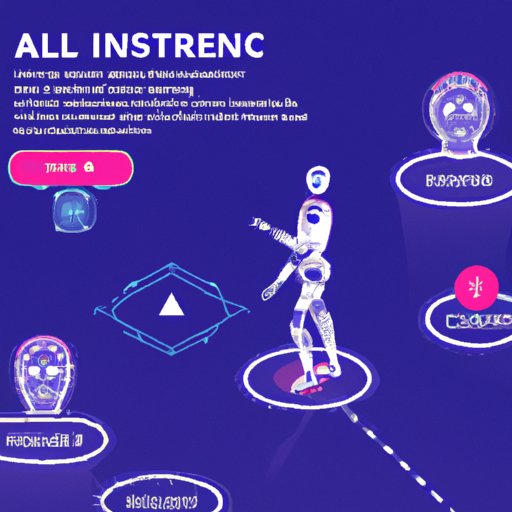Introduction
Artificial Intelligence (AI) is a rapidly growing field of technology that has the potential to revolutionize our lives. AI is defined as “the science and engineering of making intelligent machines, especially computer programs” (Merriam-Webster). As AI advances, it brings with it a number of ethical considerations that must be taken into account. This article will explore the ethical issues surrounding AI and provide strategies for addressing them.
Examining the Potential for AI-Driven Discrimination
One of the most concerning ethical issues with AI is its potential for driving discrimination. AI systems are built by humans and therefore can contain implicit biases from their creators. AI systems can also make decisions based on data that is biased or incomplete, leading to discriminatory outcomes.
For example, an AI system used for loan approval may be trained on data that contains racial bias, resulting in discriminatory outcomes. Similarly, an AI system used for job recruitment may be trained on data that only includes male candidates, resulting in fewer job opportunities for women.
In order to prevent AI-driven discrimination, organizations should strive to create AI systems that are fair, transparent, and accountable. Organizations should also ensure that their AI systems are trained on unbiased and comprehensive data. Finally, organizations should regularly audit their AI systems to identify and address any potential biases.

Addressing the Risk of Unintended Consequences with AI
Another ethical issue with AI is the risk of unintended consequences. AI systems are complex and can produce unexpected results when faced with certain inputs or scenarios. For example, an AI system used for facial recognition may mistakenly identify someone as a criminal if it is not trained on a diverse set of faces.
Organizations should strive to create AI systems that are resilient and secure. They should also ensure that their AI systems are tested extensively in order to identify and address any potential risks. Finally, organizations should have a system in place to monitor the performance of their AI systems and take corrective action when necessary.
Exploring the Moral Implications of AI Autonomy
The increasing autonomy of AI systems poses a number of ethical questions. For example, who is responsible for the actions of an autonomous AI system? Should AI systems be held to the same moral standards as humans? Who is accountable when an AI system makes a mistake?
Organizations should strive to create AI systems that are ethical and responsible. They should also ensure that their AI systems have built-in safeguards to prevent them from acting in an unethical manner. Finally, organizations should consider implementing a system of oversight to ensure that their AI systems are being used responsibly.

Investigating the Dangers of AI Misuse
Another ethical concern with AI is the potential for misuse. AI systems can be used for malicious purposes such as targeted advertising, censorship, and surveillance. For example, an AI system could be used to target vulnerable populations with deceptive advertising or to censor dissenting opinions.
Organizations should strive to create AI systems that are secure and trustworthy. They should also ensure that their AI systems are not used for malicious purposes. Finally, organizations should consider implementing policies and regulations to govern the use of AI systems.
Analyzing the Ethical Use of AI in Surveillance and Security
AI systems are increasingly being used for surveillance and security purposes. The use of AI in these areas raises a number of ethical questions, such as: Is it ethical to use AI to monitor people? Should AI be used to make decisions about public safety? How can we ensure that AI is used ethically?
Organizations should strive to create AI systems that are secure and privacy-preserving. They should also ensure that their AI systems are not used to infringe upon civil liberties. Finally, organizations should consider implementing policies and regulations to regulate the use of AI in surveillance and security.

Understanding the Impact of AI on Human Employment Opportunities
Finally, AI has the potential to significantly disrupt the labor market. As AI becomes more advanced, it could replace humans in many roles, resulting in job losses and reduced wages. This raises a number of ethical questions, such as: Are robots taking jobs away from humans? What measures can be taken to minimize the impact of AI on human employment opportunities?
Organizations should strive to create AI systems that are equitable and beneficial to humans. They should also ensure that their AI systems are not replacing humans unnecessarily. Finally, organizations should consider implementing policies and regulations to protect human jobs and wages.
Conclusion
In conclusion, AI brings with it a number of ethical considerations that must be taken into account. These include potential for discrimination, unintended consequences, moral implications, misuse, use in surveillance and security, and impact on human employment opportunities. Organizations should strive to create AI systems that are fair, transparent, secure, and ethical. They should also ensure that their AI systems are not used for malicious purposes or to infringe upon civil liberties. Finally, organizations should consider implementing policies and regulations to regulate the use of AI.
It is clear that AI brings with it a number of ethical considerations that must be addressed. It is important for organizations to be aware of the potential risks and take steps to ensure that their AI systems are used responsibly and ethically. Only then can we ensure that AI is used for the benefit of all.
(Note: Is this article not meeting your expectations? Do you have knowledge or insights to share? Unlock new opportunities and expand your reach by joining our authors team. Click Registration to join us and share your expertise with our readers.)
